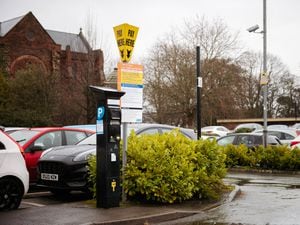‘The majority of stuff I can only recount from my diaries’: How epilepsy stole Shrewsbury mum’s memories
Shrewsbury’s Angelika Barre wants to break down stigmas around epilepsy and opens up about her own life living with the condition.
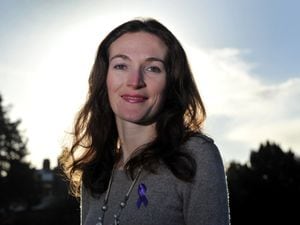
The day you get married and the birth of your first child – they are just a couple of life’s key moments and memories that many cherish forever.
But imagine not having those memories. You know these amazing things happened, but the details, the individual snapshots, the lasting impression of days that should stay with you forever lie just out of reach.
That is the case for 36-year-old Angelika Barre, who lives in Shrewsbury with her seven-year-old daughter Jessica and husband Steve.
She often finds that her memories lie beyond her fingertips – it is a little-known element of living with epilepsy.
“I really suffer with memory loss,” she says as she cradles a cup of tea in her hands in a town centre cafe. “I don’t have a lot of memories of my dad, or my childhood. I don’t know what’s happened.
“Jessica’s birth, my wedding – I know I would have had a wonderful time and I do write diaries to try and remember these events. But the majority of stuff I can only recount from my diaries. It’s very upsetting.
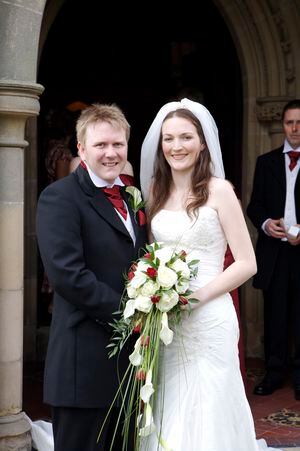
“I go back and read the diaries and say, ‘wow I’ve done stuff’. I keep the diary daily, it’s just small things really so I can go back and remember. It’s often feelings and stuff. I have a whole shed load of diaries.
“Memory loss is a big thing with epilepsy. Some suffer short terms and some suffer long term loss – I suffer both and that’s tough.”
Angelika has three types of epilepsy, a condition she says is caused by a sudden burst of electricity in the brain.
She has absent seizures, where essentially she blanks out for a a few seconds, myoclonic seizure, where the body twitches or jerks for a few seconds and tonic-clonic seizures which is where she will fall to the ground and begin to shake.
“Everyone is different in epilepsy,”she says. “The electrical activity will disrupt the normal functioning of a body.
“It depends where that activity is, for some it can be one side of the brain, for some it can go to both sides. That will affect how someone’s epilepsy is. There are over 40 types of epilepsy.”
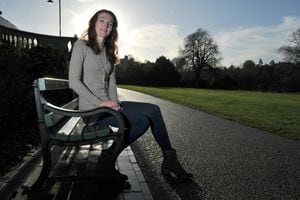
The condition has taken its toll on Angelika over the years – but she doesn’t let that get her down.
“I can’t read books sadly,” she says. “I’ll be reading, get through a few pages, be aware that I’m reading it but I’m not taking it in and I have to go back. I love reading.
“I try and look at the positives. Films for example, I feel like I’ve never seen them before, or know I’ve seen them and can’t remember what happens at the end.”
The physical seizures have often left Angelika bloodied, battered and bruised and with cuts and grazes after falling to the floor.
The absent seizures she has occur on average 50 times a day and can cause moments of blank which have caused her to fall down kerbs or walk into the path of oncoming cars.
“They happen so fast,” she says. “I’ll be going down the street and then I’ll suddenly come out of it and be like ‘well I’m obviously walking’. I’ll have taken a wrong turn or something.”
Angelika doesn’t get seizure warning signs like others who have epilepsy.
“They can just happen,” she says with a shrug of the shoulders.
She was diagnosed with epilepsy as a youngster and was largely having seizures during the night. However, this affected her school work as she was unable to concentrate or remember the revision she had been doing.
Because her school at the time didn’t know how to handle the condition Angelika says was left out of school trips and was shut out of classrooms and left in the hall.
“When I was in secondary school I was so depressed,” she says.
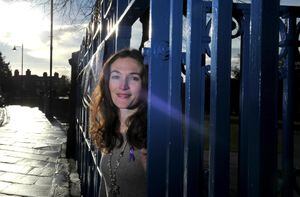
“The tablets put a lot of weight on people and I was having issues with my body going towards anorexia. At the end of school I was contemplating suicide, it was just too bad. When you hit rock bottom like that something says you just have to do something.”
Although she is unable to drive or work because of her epilepsy Angelika vowed to volunteer to raise awareness of the condition, dispel stigmas and provide education and in 2018 started her own group called the Shrewsbury Epilepsy Support Group.
“We provide support to people of all ages who are affected by epilepsy in Shrewsbury and the surrounding areas. It’s the only epilepsy support group in Shropshire that specialises in working with families and children,” she adds.
“Sadly, children, or those who have family who live with the condition, often feel isolated and unable to speak out about the condition due to fear of being bullied and judged by others. This is mainly due to the lack of education, stigmas an incorrect facts given to people throughout the decades.”
As well as holding sessions for families, which include fun and informal events, the group are also offering awareness training to businesses, schools or groups in the community. They also arrange social get together like meals for over 18s.
If you would like to learn more about the group, or want to get in touch with Angelika then please visit shepsgroup.uk or email ange.barre@shepsgroup.uk



